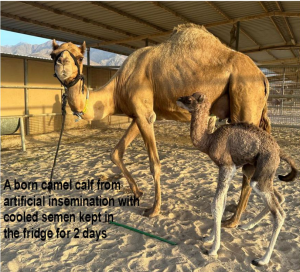
Challenges in Short-Term Preservation of Camel Semen at 5°C: A Breakthrough in Fertility
Camel breeding plays a vital role in regions where these animals are essential for transportation, dairy production, and cultural heritage. However, preserving camel semen for short-term use has posed significant challenges, particularly when cooled to 5°C. Recently, we achieved a major milestone: fertility with semen preserved for three days at refrigeration temperature. This success, enabled by developing our own specialized semen extender, marks a transformative step in camel breeding.
Camel semen presents specific difficulties:
1. High Viscosity: The thick nature of camel semen complicates its handling and interaction with extenders.
2. Cold Sensitivity: Cooling to 5°C often damages sperm membranes, reducing motility and viability.
3. Bacterial Contamination: The camel's reproductive anatomy increases the risk of contamination during semen collection.
4. Lack of Specialized Extenders: Limited research has hindered the development of effective preservation media for camel semen.
Our team developed a tailored semen extender that solved these challenges. This extender maintained osmotic balance, protected sperm membranes, and minimized cooling-induced stress. Combined with optimized collection protocols, gradual cooling, and regular quality assessments, this innovation ensured the viability of stored semen for up to three days.
This advancement addresses longstanding logistical and economic challenges in camel breeding. Key benefits include:
1. Reduced Transportation Costs: Elite males’ semen can be transported instead of moving animals across long distances.
2. Preservation of Genetic Diversity: Sharing genetic material across regions becomes more feasible.
3. Enhanced Breeding Programs: Controlled breeding using artificial insemination improves offspring quality.
4. Animal Welfare: Less transportation reduces stress and health risks for camels.
While this breakthrough is a significant achievement, further research is necessary to refine preservation techniques and extend storage durations. Developing solutions for long-term cryopreservation will unlock even greater potential.
In conclusion, our success in achieving fertility with camel semen stored for three days at 5°C, using a custom-developed semen extender, offers a promising future for the camel breeding industry. This advancement simplifies logistics, reduces costs, and enhances breeding efficiency, ensuring the sustainability and genetic progress of these invaluable animals.
